https://e360.yale.edu/features/how-chinas-expanding-fishing-fleet-is-depleting-worlds-oceans
When a vast Chinese armada appeared outside the Galapagos Marine Reserve in South America earlier this year, Ecuador's Government sounded the alarm.
They called in the big guns, asking the United States Coast Guard to help keep an eye on the enormous number of fishing vessels.
The sheer size of the fleet fuelled Ecuador's urgency: more than 350 Chinese fishing boats were detected, outnumbering its own navy and those of Peru and Chile combined.
Lieutenant-Commander Kristen Caldwell of the US Coast Guard, which sent a vessel down to the region to provide surveillance on the fleet, said the magnitude of fishing activity was unprecedented.
The flotilla was plundering waters that are among the most biodiverse in the world: the Galapagos Marine Reserve is home to the greatest biomass of sharks on the planet.
Satellite tracking data showed the boats forming a near-perfect line along the boundary of Ecuador's exclusive economic zone (EEZ) — however the US Coast guard did not detect any of the Chinese boats cross over into Ecuadorian waters.
"The issue is that fish don't know borders," Lieutenant-Commander Caldwell told the ABC.
Fishing in international waters is not illegal, even if those waters sit right beside areas of great ecological importance.
And that's the real catch: even with a veneer of legality, these activities are potentially catastrophic for the environment and for local fish stocks.
Armed with huge Chinese Government subsidies, this massive fleet is now being deployed across nearly every ocean of the world — including on Australia's doorstep, with a new planned Chinese-funded fisheries development near Papua New Guinea's Daru Island, which lies in the Torres Strait.
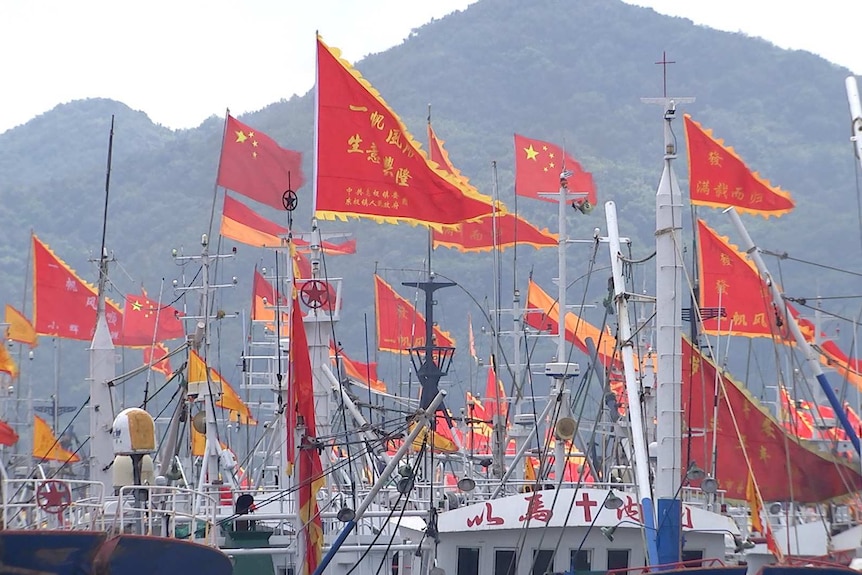
China's distant water fleet is enormous even compared to that of wealthy nations like the US. (ABC News: Steve Wang)
Keeping the industry strong has been a priority for China's central government: in 2013, President Xi Jinping urged Chinese mariners to "build bigger ships and venture even farther and catch bigger fish".
Beijing says its distant water fishing fleet numbers around 2,500 ships, but one study claimed it could have as many as 17,000 boats trawling the world's oceans. The US, by comparison, has just 300 distant water vessels.
China is a fisheries superpower: according to the UN, it consumes around 36 per cent of total global fish production, and hauls in 15.2 million tonnes of marine life a year, or 20 per cent of the world's entire annual catch.
Its fleets, including those in the Galapagos, are vast and complex.
There are trawlers, refuelling ships, freezer and transport vessels that allow them to continue operating without going to port for months at a time, sometimes longer.
Ian Urbina, the author of Outlaw Ocean, has spent years writing about fishing on the high seas and says while illegal, unreported and unregulated fishing (IUU fishing) was an issue worldwide, China is unique.
"More than any other fishing fleet in the world, [China] travels farther, stays at sea longer, pulls up more fish than anyone, and is also more routinely invading national waters," he said.
It's unsurprising then that China ranks number one on the IUU fishing index.
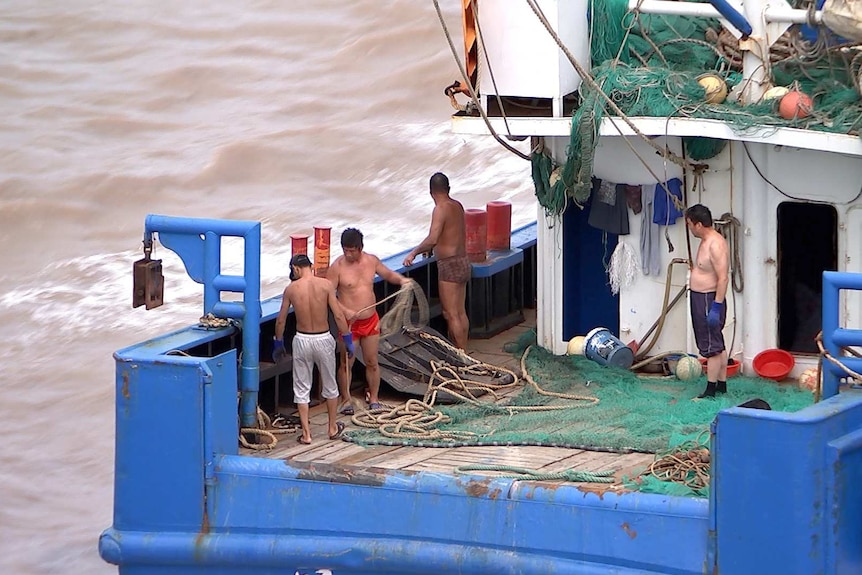
China has deployed its fishing fleet around the world, even in the contested South China Sea. (ABC News: Steve Wang)
The fleet is routinely found to be violating the law, targeting endangered shark species, falsifying licenses and documentation, as well as committing human rights abuses onboard its vessels.
And while United Nations maritime law mandates that fishing vessels are required to use a transponder to transmit their location at all times, Mr Urbina said many vessels deliberately switched them off.
"Some of them are going dark for short periods, and what they're doing in those periods is unknown."
This year's flotilla was the biggest, but Chinese trawlers had been fishing in those waters for years.
In 2017, the Chinese refrigeration vessel Fu Yuan Yu Leng 999 was pursued and boarded by Ecuadorian authorities inside the Galapagos Marine Reserve.
On board, they found a gruesome haul: 6,000 frozen shark carcasses, many of endangered species, were seized.
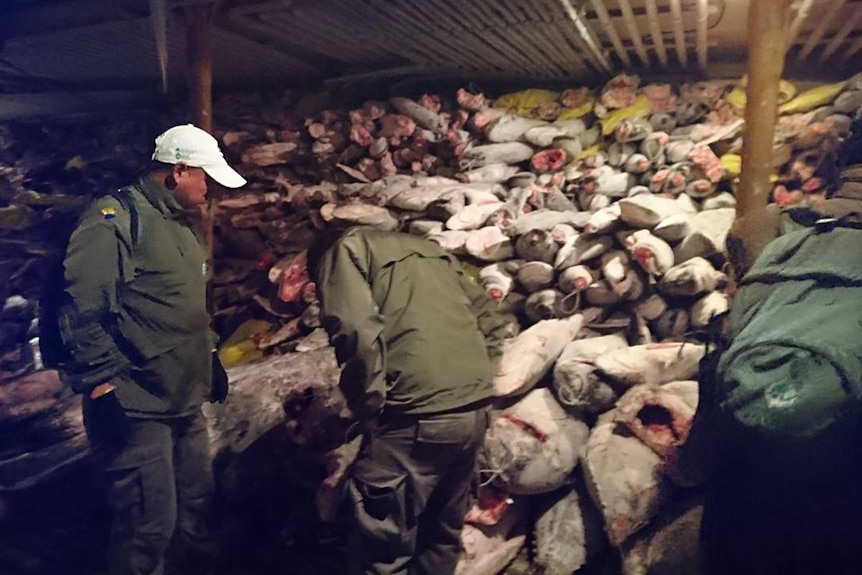
The vessel's captain and crew were charged with a number of crimes. (Environment Ministry of Ecuador via AFP)
Shark fins are a delicacy and a lucrative trade in Asia, but fishing for them and removing their fins is illegal in many jurisdictions, including Ecuador.
Fishing ships have even been deployed in the contested South China Sea — although fishing does not appear to be the core objective there.
"The Chinese are using their fishing fleet to assert their presence in the South China Sea," said Tabitha Grace Mallory, an expert on China's fishing policies at the University of Washington.
"In some cases [their] fishing vessels aren't even fishing, they're likely to be maritime militia vessels, which are getting paid to just assert some kind of presence in the area."
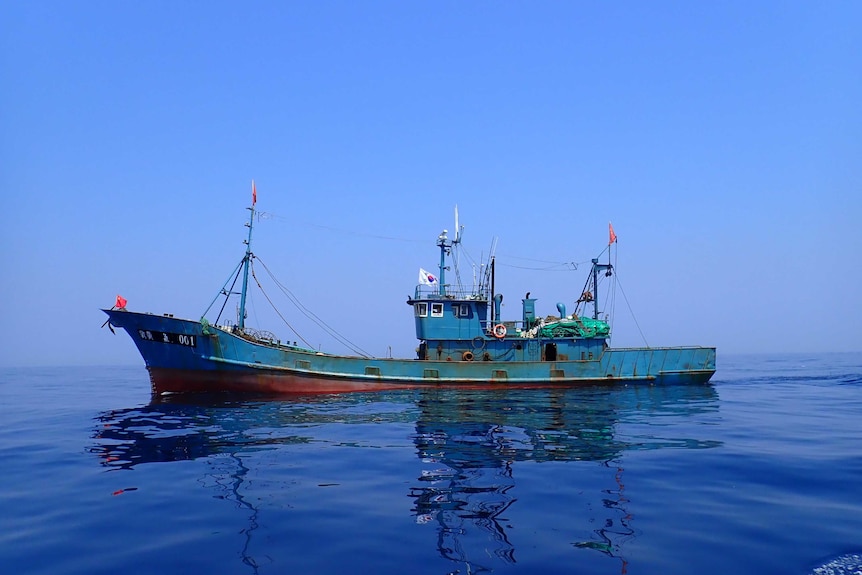
Chinese fishing vessels have displaced local small-scale fishermen in West Africa. (Global Fishing Watch, via East Sea Fisheries Management Service, South Koreaa)
In West Africa, Chinese companies have opened up a new front for marine exploitation.
Cash-strapped governments are selling their fishing rights to overseas companies, but due to those same economic challenges, officials are mostly unable to ensure the fishing going on is legal.
Nowhere is this problem more acute than in the small coastal nation of Ghana.
Ghanaian law requires that all trawlers operating in its waters are owned by Ghanaians, but right now there are more than 100 Chinese trawlers plundering waters normally fished by local boats.
"We have all the laws, honestly I still can't understand why the laws are not working," Nana Jojo Solomon of the Ghana Fisherman Council told the ABC.
"[The trawlers] all have Chinese names, they are Chinese vessels — if they are Ghanaian vessels, why don't they have Ghanaian names on them?"
Max Schmid, Deputy Director of the Environmental Justice Foundation, works closely with West African governments looking to tackle illegal fishing.
He said Chinese companies were finding ways to get around Ghana's laws, which are supposed to protect local fishermen.
"Chinese companies are using small Ghanaian front companies with only a handful of employees and very little capital," he said.
"Our research suggests they're Chinese trawlers, with Chinese captains."
Mr Schmid said one trawler can land up to 26 tonnes of fish in a day, the equivalent of what 400 local canoes could haul.
The damage China's boats are causing is staggering: the income for artisanal fishermen in Ghana — people who rely on fishing for subsistence and local trade — has nearly halved since the turn of the century, according to Mr Solomon.
"Scientists have predicted that if we allow these vessels to continue to fish the way they are, come the end of this year, there will be a complete decline of artisanal fishing," he said.
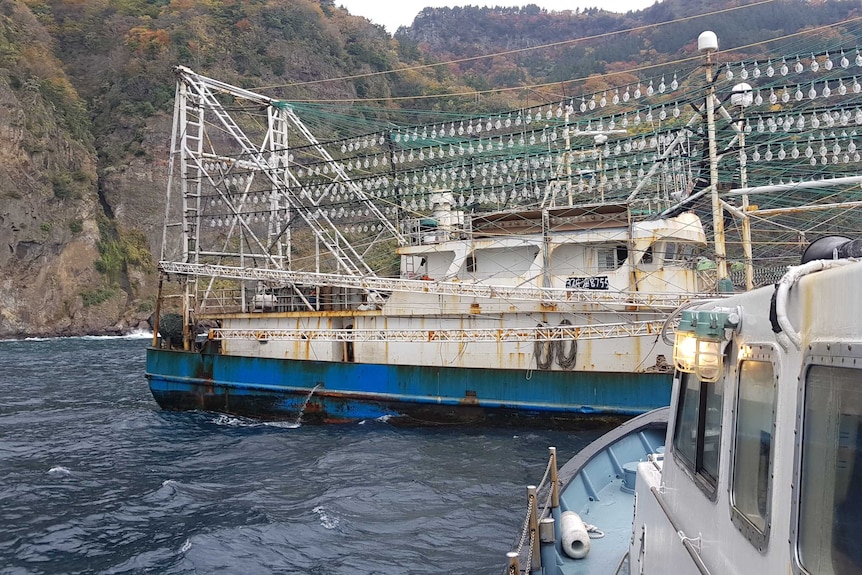
China's fishing fleets have caused disruption much closer to its own shores too. (Global Fishing Watch, via Ulleung-gun County Office)
For years, the morbid phenomenon of North Korean "ghost ships" washing up on the west coast of Japan has provoked fascination and concern.
Small, ill-equipped fishing boats have been landing on shores empty, or carrying the bodies of North Korean sailors.
The exact reason why so many ships were adrift was unclear. One explanation was an increase in fish quotas set by Kim Jong-un's regime, in response to tightened international sanctions.
But a discovery made this year by a team of researchers has shone new light on what might be happening out at sea.
Quentin Hanich from the Australian National Centre for Ocean Resources and Security at the University of Wollongong was part of that team.
"The South Korean Coast Guard started reporting large numbers of Chinese fishing vessels transiting through their waters on the way up to North Korea," he said.
The team used a combination of satellite and tracking data to get a lock on what was going on — and what they found was astonishing.
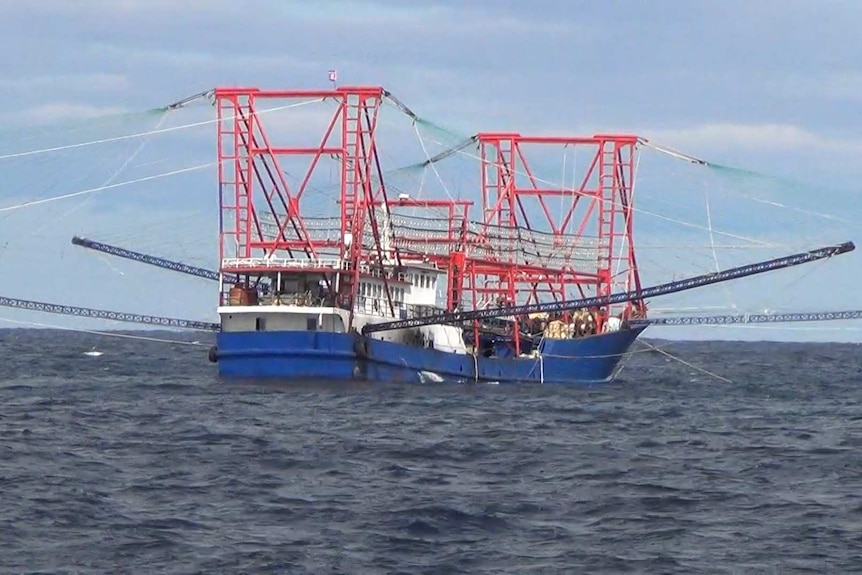
North Korean fishermen have had to make dangerous trips in order to compete with China. (Global Fishing Watch: Seung-Ho Lee)
"Approximately 900 fishing boats originating from China were transiting through South Korean waters into North Korea, and were engaging in large-scale industrial fishing," Dr Hanich said.
This was in open defiance of United Nations sanctions against North Korea, which prohibit the selling of fishing licenses to overseas buyers — but Dr Hanich and his team confirmed they were still for sale on Chinese-language websites.
"This basically provides millions of dollars of revenue and hard currency to the North Korean regime — and the Chinese Government, I am guessing, is just basically turning a blind eye to it," he said.
In the process, small-scale fishermen in North Korea were likely finding it much harder to get fish, and were needing to sail farther afield for their catches — hence the appearance of "ghost ships" along Japan's coast.
Dr Hanich's team also identified nearly 3,000 North Korean boats illegally fishing in Russian waters across 2017 and 2018.
"[The Chinese fishing boats] are effectively displacing all the small scale North Korean artisanal fishermen who can't compete," he said.
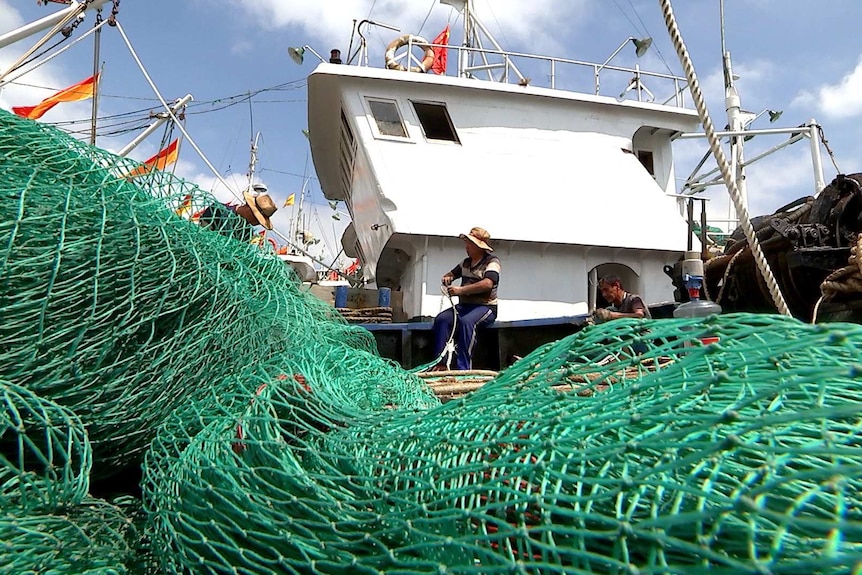
High seas fishing can be near lawless, and China isn't the only offender. (ABC News: Steve Wang)
China insists it is working to ensure its fishing fleets are acting sustainably and legally.
The ABC requested comment from China's Ministry of Agriculture, which is responsible for fisheries, but did not receive a reply.
China announced a partial moratorium on squid fishing around South America this year, and Beijing's 2020 white paper on offshore fisheries indicates China is serious about dealing with rogue companies.
However reeling in China's distant water fleets will require a cohesive international strategy on managing marine resources.
According to Mr Urbina, the high seas are often near lawless and rife with brazen criminality when it comes to fishing, and not just from China.
"Rules are only as good as their enforcement, and the enforcement mechanism for what anaemic and murky rules do exist is really poor," he said.
Experts say there is also a risk of nations acting in their own self-interest by plundering the ocean unsustainably.
"The European Union is overfishing Yellowfin in the Indian Ocean to unsustainable levels — the United States has a fleet of purse seiners that, year in year out, exceed their high seas fishing limits," Dr Hanich said.
In Ecuador, China's flotilla of factory ships have now moved on.
When asked what might happen next year, WWF Ecuador's fisheries director Pablo Guerrero laughed.
"There's 1.4 billion people in China, they need to provide food for growing a population — so what is the alternative," he said.
"They will be back. For sure they will be back."
When a vast Chinese armada appeared outside the Galapagos Marine Reserve in South America earlier this year, Ecuador's Government sounded the alarm.
They called in the big guns, asking the United States Coast Guard to help keep an eye on the enormous number of fishing vessels.
The sheer size of the fleet fuelled Ecuador's urgency: more than 350 Chinese fishing boats were detected, outnumbering its own navy and those of Peru and Chile combined.
Lieutenant-Commander Kristen Caldwell of the US Coast Guard, which sent a vessel down to the region to provide surveillance on the fleet, said the magnitude of fishing activity was unprecedented.
The flotilla was plundering waters that are among the most biodiverse in the world: the Galapagos Marine Reserve is home to the greatest biomass of sharks on the planet.
Satellite tracking data showed the boats forming a near-perfect line along the boundary of Ecuador's exclusive economic zone (EEZ) — however the US Coast guard did not detect any of the Chinese boats cross over into Ecuadorian waters.
"The issue is that fish don't know borders," Lieutenant-Commander Caldwell told the ABC.
Fishing in international waters is not illegal, even if those waters sit right beside areas of great ecological importance.
And that's the real catch: even with a veneer of legality, these activities are potentially catastrophic for the environment and for local fish stocks.
Armed with huge Chinese Government subsidies, this massive fleet is now being deployed across nearly every ocean of the world — including on Australia's doorstep, with a new planned Chinese-funded fisheries development near Papua New Guinea's Daru Island, which lies in the Torres Strait.
China a fisheries superpower
China's distant water fleet is enormous even compared to that of wealthy nations like the US. (ABC News: Steve Wang)
Keeping the industry strong has been a priority for China's central government: in 2013, President Xi Jinping urged Chinese mariners to "build bigger ships and venture even farther and catch bigger fish".
Beijing says its distant water fishing fleet numbers around 2,500 ships, but one study claimed it could have as many as 17,000 boats trawling the world's oceans. The US, by comparison, has just 300 distant water vessels.
China is a fisheries superpower: according to the UN, it consumes around 36 per cent of total global fish production, and hauls in 15.2 million tonnes of marine life a year, or 20 per cent of the world's entire annual catch.
Its fleets, including those in the Galapagos, are vast and complex.
There are trawlers, refuelling ships, freezer and transport vessels that allow them to continue operating without going to port for months at a time, sometimes longer.
Ian Urbina, the author of Outlaw Ocean, has spent years writing about fishing on the high seas and says while illegal, unreported and unregulated fishing (IUU fishing) was an issue worldwide, China is unique.
"More than any other fishing fleet in the world, [China] travels farther, stays at sea longer, pulls up more fish than anyone, and is also more routinely invading national waters," he said.
It's unsurprising then that China ranks number one on the IUU fishing index.
China has deployed its fishing fleet around the world, even in the contested South China Sea. (ABC News: Steve Wang)
The fleet is routinely found to be violating the law, targeting endangered shark species, falsifying licenses and documentation, as well as committing human rights abuses onboard its vessels.
And while United Nations maritime law mandates that fishing vessels are required to use a transponder to transmit their location at all times, Mr Urbina said many vessels deliberately switched them off.
"Some of them are going dark for short periods, and what they're doing in those periods is unknown."
This year's flotilla was the biggest, but Chinese trawlers had been fishing in those waters for years.
In 2017, the Chinese refrigeration vessel Fu Yuan Yu Leng 999 was pursued and boarded by Ecuadorian authorities inside the Galapagos Marine Reserve.
On board, they found a gruesome haul: 6,000 frozen shark carcasses, many of endangered species, were seized.
The vessel's captain and crew were charged with a number of crimes. (Environment Ministry of Ecuador via AFP)
Shark fins are a delicacy and a lucrative trade in Asia, but fishing for them and removing their fins is illegal in many jurisdictions, including Ecuador.
Fishing ships have even been deployed in the contested South China Sea — although fishing does not appear to be the core objective there.
"The Chinese are using their fishing fleet to assert their presence in the South China Sea," said Tabitha Grace Mallory, an expert on China's fishing policies at the University of Washington.
"In some cases [their] fishing vessels aren't even fishing, they're likely to be maritime militia vessels, which are getting paid to just assert some kind of presence in the area."
'The laws are not working'
Chinese fishing vessels have displaced local small-scale fishermen in West Africa. (Global Fishing Watch, via East Sea Fisheries Management Service, South Koreaa)
In West Africa, Chinese companies have opened up a new front for marine exploitation.
Cash-strapped governments are selling their fishing rights to overseas companies, but due to those same economic challenges, officials are mostly unable to ensure the fishing going on is legal.
Nowhere is this problem more acute than in the small coastal nation of Ghana.
Ghanaian law requires that all trawlers operating in its waters are owned by Ghanaians, but right now there are more than 100 Chinese trawlers plundering waters normally fished by local boats.
"We have all the laws, honestly I still can't understand why the laws are not working," Nana Jojo Solomon of the Ghana Fisherman Council told the ABC.
"[The trawlers] all have Chinese names, they are Chinese vessels — if they are Ghanaian vessels, why don't they have Ghanaian names on them?"
Max Schmid, Deputy Director of the Environmental Justice Foundation, works closely with West African governments looking to tackle illegal fishing.
He said Chinese companies were finding ways to get around Ghana's laws, which are supposed to protect local fishermen.
"Chinese companies are using small Ghanaian front companies with only a handful of employees and very little capital," he said.
"Our research suggests they're Chinese trawlers, with Chinese captains."
Mr Schmid said one trawler can land up to 26 tonnes of fish in a day, the equivalent of what 400 local canoes could haul.
The damage China's boats are causing is staggering: the income for artisanal fishermen in Ghana — people who rely on fishing for subsistence and local trade — has nearly halved since the turn of the century, according to Mr Solomon.
"Scientists have predicted that if we allow these vessels to continue to fish the way they are, come the end of this year, there will be a complete decline of artisanal fishing," he said.
Bankrolling North Korea's regime
China's fishing fleets have caused disruption much closer to its own shores too. (Global Fishing Watch, via Ulleung-gun County Office)
For years, the morbid phenomenon of North Korean "ghost ships" washing up on the west coast of Japan has provoked fascination and concern.
Small, ill-equipped fishing boats have been landing on shores empty, or carrying the bodies of North Korean sailors.
The exact reason why so many ships were adrift was unclear. One explanation was an increase in fish quotas set by Kim Jong-un's regime, in response to tightened international sanctions.
But a discovery made this year by a team of researchers has shone new light on what might be happening out at sea.
Quentin Hanich from the Australian National Centre for Ocean Resources and Security at the University of Wollongong was part of that team.
"The South Korean Coast Guard started reporting large numbers of Chinese fishing vessels transiting through their waters on the way up to North Korea," he said.
The team used a combination of satellite and tracking data to get a lock on what was going on — and what they found was astonishing.
North Korean fishermen have had to make dangerous trips in order to compete with China. (Global Fishing Watch: Seung-Ho Lee)
"Approximately 900 fishing boats originating from China were transiting through South Korean waters into North Korea, and were engaging in large-scale industrial fishing," Dr Hanich said.
This was in open defiance of United Nations sanctions against North Korea, which prohibit the selling of fishing licenses to overseas buyers — but Dr Hanich and his team confirmed they were still for sale on Chinese-language websites.
"This basically provides millions of dollars of revenue and hard currency to the North Korean regime — and the Chinese Government, I am guessing, is just basically turning a blind eye to it," he said.
In the process, small-scale fishermen in North Korea were likely finding it much harder to get fish, and were needing to sail farther afield for their catches — hence the appearance of "ghost ships" along Japan's coast.
Dr Hanich's team also identified nearly 3,000 North Korean boats illegally fishing in Russian waters across 2017 and 2018.
"[The Chinese fishing boats] are effectively displacing all the small scale North Korean artisanal fishermen who can't compete," he said.
'Rules are only as good as their enforcement'
High seas fishing can be near lawless, and China isn't the only offender. (ABC News: Steve Wang)
China insists it is working to ensure its fishing fleets are acting sustainably and legally.
The ABC requested comment from China's Ministry of Agriculture, which is responsible for fisheries, but did not receive a reply.
China announced a partial moratorium on squid fishing around South America this year, and Beijing's 2020 white paper on offshore fisheries indicates China is serious about dealing with rogue companies.
However reeling in China's distant water fleets will require a cohesive international strategy on managing marine resources.
According to Mr Urbina, the high seas are often near lawless and rife with brazen criminality when it comes to fishing, and not just from China.
"Rules are only as good as their enforcement, and the enforcement mechanism for what anaemic and murky rules do exist is really poor," he said.
Experts say there is also a risk of nations acting in their own self-interest by plundering the ocean unsustainably.
"The European Union is overfishing Yellowfin in the Indian Ocean to unsustainable levels — the United States has a fleet of purse seiners that, year in year out, exceed their high seas fishing limits," Dr Hanich said.
In Ecuador, China's flotilla of factory ships have now moved on.
When asked what might happen next year, WWF Ecuador's fisheries director Pablo Guerrero laughed.
"There's 1.4 billion people in China, they need to provide food for growing a population — so what is the alternative," he said.
"They will be back. For sure they will be back."


